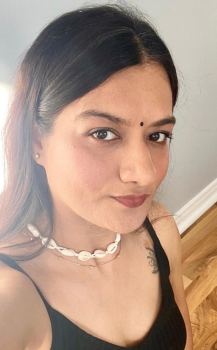
Deepti Sehgal is a Master Yoga Teacher - RYT 500 from Yoga Appliance International, India, trained & certified in traditional forms of Yoga including Hatha yoga from the traditional lineage of Sivananda Yoga Vedanta Ashrams, India. Deepti is also a registered member of the Indian Yoga Association. She is currently pursuing training in Ashtanga Vinyasa Yoga, Mysore style, from an authorized Ashtanga teacher in India. She also holds a Master’s degree in Yoga & Science of Living. Deepti is also an Ayurveda Lifestyle practitioner & merges her Yoga practice quite deeply with the Ayurveda approach to Yogasanas, Pranayama & Meditation practice. Her approach to Yoga is Ayurvedic & she blends the Ayurveda concepts of doshas & gunas in her Hatha & Vinyasa Yoga teachings. With her online Yoga studio space ‘The Yogaguru-Canada’, she brings the traditional Yoga lineage to Canada. The Yoga guru is a reputed yoga shala in India that trains students on traditional Yoga concepts. Deepti heads the online Yoga & Ayurveda classes & TTC 200 & 500 programs under its Canada branch.
An ex-software engineer with a Master's in Computers & a fulfilling career in the software domain in the past, Deepti decided to follow her true calling into Macrobiotics, Yoga & Ayurveda about a decade back starting with her international certification as a Macrobiotic Diet Consultant from the US. Gradually she went on to pursue education in traditional Yoga, Ayurveda & basics of Traditional Chinese Medicine. Also an ICF certified Wellness coach, and an author, Deepti is also the founder of an Indian skincare brand (www.svarasya.com). She deeply incorporates Yoga & Ayurveda together in her personal practice co-joined with dietary principles coming in from Macrobiotics & Raw Food principles.
Deepti is passionate about spreading knowledge about Eastern Healing practices adopted from Ayurveda, Yoga, Macrobiotics, Traditional Chinese Medicine, Qi Gong, and Raw, Alkaline & Living Foods philosophy. Her podcast ‘Youvana the Ageless’ is about sharing the secrets of ancient knowledge that highly contribute towards, health, beauty, vitality & well-being. Being a podcaster, she interviews experts from various ancient Eastern medicine practice domains for a conversation on the ancient art of health, wellness, beauty, ageless living, vitality & longevity. Her podcast has emerged from her innate desire to impart knowledge and experience on ageless living at the body, mind, and consciousness levels.
Deepti has been awarded “Make in India” Award for her contribution to the field of Nutrition.
Connect with Deepti Sehgal
